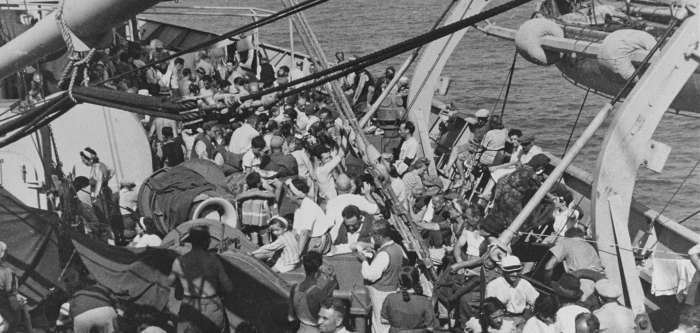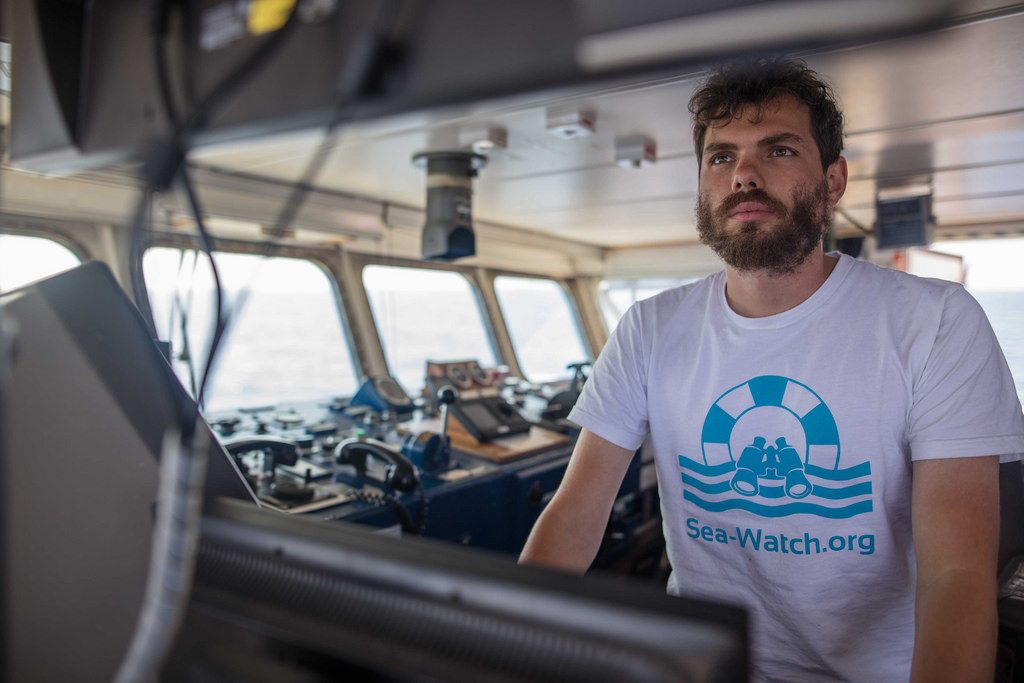The crew of Sea Watch 3 urges the Maltese public to support their pledge to set them free. The only issue of the vessel and the only wrongdoing of the crew was saving lives—the lives that should be as valuable as ours, alas they seem not to be.
by Raisa Galea
Image: Sea Watch 3 – Mission 8 / 2018 by Sea-Watch Org / Flickr
[dropcap]F[/dropcap]or a moment, picture this scenario: one day, after a street fight between a group of partisan die-hards, the poisonous PN-PL rivalry escalates to an armed conflict. It lasts a day, two, three. A week passes and the conflict is still on. Weeks add to months and the country starts falling into disarray. You fear for your safety and the safety of your children; you decide to flee Malta. Meanwhile, the continental European countries have taken “a Europe that protects” seriously and you no longer can move from one EU country to another without a visa. Although Maltese citizens obtain a visa fairly quickly in regular circumstances, the internal conflicts have changed everything: Maltese applicants are now subjected to extra scrutiny and half of the applications are rejected.
The British, French, German and Italian authorities see Maltese as a threat, pointing to the prominent stereotype of Malta as a ‘mafia state’. The media in these countries informs its readers that Maltese are loud, uncouth, lawbreakers and not true Europeans. French, Germans and Italians are not willing to welcome Maltese with open arms—they have their problems to deal with and have no intention to share their countries with criminals who, additionally, are culturally incompatible with them.
The situation in Malta continues to deteriorate. Hardly does anyone remember who began this confrontation, but it becomes more violent by the day. Left with no choice, you and your family decide to leave on a boat at night. There is a problem though: the owner of the boat treats the misfortune that’s befallen Malta as an excellent business opportunity. He says that the risks of transporting you to Italy without visa are too great and demands an exuberant amount. Plus, you’ll have to share the boat with a hundred more people, even though it’s way over the capacity of the vessel.
The night you leave, the sea is calm, yet right in the middle of your journey il-majjistral picks up. The wind is so strong that it slows down the already overcrowded boat, the currents are carrying you further from the destination. At some point, the captain announces there might not be enough fuel to arrive to Sicily. He sends SOS signals to the vessels in the vicinity, but they are instructed not to recover ‘illegals’. Fear paralyses your body. What if you don’t make it to safety? What if you all drown?


[dropcap]I[/dropcap]mplausible and far-fetched as it seems, this scenario might materialise one day. There is always a possibility that Maltese, as any other people, might need to seek asylum. At the same time, the rise of the far-right parties to power in the EU countries makes the cancellation of visa-free travel within the Schengen all the more plausible.
The freedom of movement has not always been a privilege of nationals of the economically advanced countries—many travellers in the West required exit visas in order to leave their country during World War II. Europe has not always been a destination for refugees either—only a few decades ago, during World War II, the ‘refugee crisis’ was happening in the opposite direction: Europeans fled to North Africa, particularly to Morocco, which was a French protectorate at the time, in the hope of obtaining exit documents.
As Atossa Araxia Abrahamian reminds us, quoting the narrator of Casablanca,
migrants travelled “from Paris to Marseille across the Mediterranean to Oran, then by train, or auto, or foot, across the rim of Africa to Casablanca. […] There, they’d bribe an official, buy papers on the black market, or find some other way to procure exit documents, and wait for the next boat or plane to freedom. […] The fortunate ones, through money, or influence, or luck, might obtain exit visas and scurry to Lisbon, and from Lisbon to the New World, but the others wait in Casablanca… and wait… and wait… and wait.”
The refugees from Europe were not welcome in America. At the time Casablanca was made, anti-refugees and anti-Semitic rhetoric was widespread in the U.S.
Many of those who choose to focus on the legal aspect of migration insist that refugees and migrants must obtain a visa or an asylum status before reaching Europe. This view, however, reveals gross unawareness of a visa application procedure. Those who have never passed through a humiliating experience of being rejected a visa or an entry simply on the basis of their nationality find it hard to empathise with the cause. Since I’ve been through the nightmare of dealing with dehumanising bureaucracy for many years, I can affirm that a visa is not an invitation ticket. The very purpose of visa is to keep a person out of the country for the duration of their life, except a few weeks of visa duration.
[beautifulquote align=”left” cite=””]A German can visit 177 countries visa-free; a Maltese—169, an Afghan—only 24.[/beautifulquote]
The freedom to travel freely or to be deprived of it is outside of our individual responsibility. Rather, it is a birth right—or a curse. A German can visit 177 countries visa-free; a Maltese—169, an Afghan—only 24. None of them chose to be born in their country of origin, yet some turn into ‘undesirables’ simply due to their birthplace and nationality. Even high-profile officials and prominent culture ambassadors of countries like Somalia, Pakistan, Palestine, Lebanon or Ethiopia might be rejected a visa. Is it then surprising that a Schengen visa is inaccessible for the majority of ordinary citizens of these countries? Nobody would have chosen to risk their lives—and die at sea—had there been a safer way to escape from war or extreme poverty (brought by, to a large extent, by foreign policies of Europe and the U.S.) Had you been in their shoes, would you not have done the same?

[dropcap]A[/dropcap]s LIFELINE and Sea-Watch 3 remain detained in Malta, people are sentenced to death by drowning. 1,405* have lost their lives in the Mediterranean since the beginning of 2018. Their only crime was not having a privileged passport—and a solid bank account. As the Sea Watch 3 crew explained, with only one rescue vessel remaining on the mission, more lives will be lost. Stefanie, a paramedic at Sea Watch 3, urges the Maltese public to support the crew’s pledge to set them free. The only issue of the vessel and the only wrongdoing of the crew was saving lives—the lives that should be as valuable as ours, alas they seem not to be.
Stefanie cannot bear the thought of innocent people stranded at sea, losing hope, before the sea becomes their grave: “One mission on Sea Watch lasts 3 weeks and none of the volunteers is allowed to stay for more than one mission in a row. Once you’re at sea, once you rescue people, you understand how important it is to be there and you want to go again, again and again. Not being involved creates a psychological pressure.”
She explains that the lives of refugees and migrants depend on a complex decision-making procedure that the crew has no control of:
[beautifulquote align=”full” cite=””]When people step on board of Sea Watch 3, they often collapse because they finally feel safe, but the vessel is slow; we cannot transport them to the closest port since it would take too long. We communicate with faster vessels in the vicinity, most often military ones, so they can carry the people to the shore. A captain has to request the permission of the port authorities who’d need to obtain another permission from their seniors. In the meantime, people remain on board, some—too weak, others—injured.[/beautifulquote]
She adds that the Libyan coastguards cannot be trusted since they physically abuse people before returning them back to Libya, where they are placed in appalling conditions compared to Nazi concentration camps.
Saving lives is not a crime. Complacency with the loss of lives right on our doorstep cannot—ought not to—prevail. We cannot applaud this cold-blooded brutality. We too might need help of a rescue mission one day.

*It has been brought to my attention that, as of 18th July 2018, the number of dead/missing in the Mediterranean since the beginning of the year is 1,489.


Leave a Reply